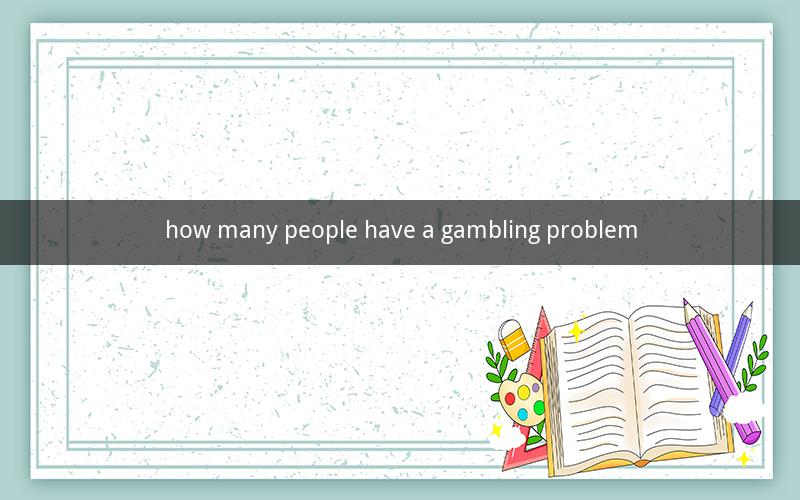
How Many People Have a Gambling Problem?
Table of Contents
1. Understanding Gambling Addiction
2. Statistics on Gambling Addiction
3. Factors Contributing to Gambling Problems
4. The Impact of Gambling on Individuals and Society
5. Treatment and Support for Gambling Addiction
6. Prevention and Education
7. Conclusion
1. Understanding Gambling Addiction
Gambling addiction, also known as compulsive gambling, is a behavioral addiction characterized by an individual's inability to control their gambling behavior. Those suffering from gambling addiction often experience a loss of control, preoccupation with gambling, and a desire to gamble despite negative consequences. Understanding the nature of gambling addiction is crucial in addressing the issue and providing support for those affected.
2. Statistics on Gambling Addiction
The prevalence of gambling addiction varies across different regions and demographics. According to the National Council on Problem Gambling, approximately 2-3% of the adult population in the United States has a gambling problem. However, this figure may not accurately reflect the true extent of the issue due to underreporting and the stigma associated with seeking help.
3. Factors Contributing to Gambling Problems
Several factors contribute to the development of gambling problems. These include:
- Genetic predisposition: Research suggests that genetics play a role in the development of gambling addiction.
- Environmental factors: The availability of gambling opportunities, exposure to gambling in the media, and social influences can contribute to the development of gambling problems.
- Mental health issues: Individuals with certain mental health conditions, such as depression and anxiety, may be more susceptible to developing gambling problems.
- Lifestyle factors: Financial stress, unemployment, and social isolation can also contribute to the development of gambling addiction.
4. The Impact of Gambling on Individuals and Society
Gambling addiction can have severe consequences for individuals and society. Some of the impacts include:
- Financial problems: Compulsive gamblers often experience significant financial losses, leading to debt, bankruptcy, and foreclosure.
- Mental health issues: Gambling addiction can exacerbate mental health conditions, such as depression and anxiety.
- Physical health issues: Compulsive gamblers may experience stress-related health issues, such as heart disease and sleep disorders.
- Family and relationships: Gambling addiction can strain relationships, leading to separation, divorce, and family breakdown.
- Crime: Some individuals with gambling problems may turn to illegal activities to fund their addiction, such as theft and fraud.
5. Treatment and Support for Gambling Addiction
Treating gambling addiction involves a combination of therapy, support groups, and self-help strategies. Some common treatment approaches include:
- Cognitive-behavioral therapy (CBT): CBT helps individuals identify and change negative thought patterns and behaviors associated with gambling addiction.
- Support groups: Support groups, such as Gamblers Anonymous, provide individuals with a platform to share their experiences and receive support from others who have faced similar challenges.
- Self-help strategies: Self-help strategies, such as setting limits on gambling activities and avoiding triggering situations, can also be effective in managing gambling addiction.
6. Prevention and Education
Preventing gambling addiction involves a multi-faceted approach that includes education, policy, and regulation. Some strategies for prevention and education include:
- Public awareness campaigns: Raising awareness about the risks of gambling addiction can help individuals make informed decisions about their gambling behavior.
- Education in schools: Including gambling education in school curricula can help young people develop a critical understanding of gambling and its potential risks.
- Regulation: Implementing regulations on advertising, access to gambling opportunities, and age restrictions can help reduce the risk of gambling addiction.
7. Conclusion
Gambling addiction is a complex issue with significant consequences for individuals and society. Understanding the nature of the problem, recognizing the factors contributing to gambling addiction, and implementing effective prevention and treatment strategies are crucial in addressing this issue. By working together, we can help reduce the prevalence of gambling addiction and support those affected by this behavioral disorder.
Questions and Answers
1. Question: What is the prevalence of gambling addiction in the United States?
Answer: The prevalence of gambling addiction in the United States is estimated to be around 2-3% of the adult population.
2. Question: What are some factors contributing to the development of gambling problems?
Answer: Factors contributing to gambling problems include genetic predisposition, environmental factors, mental health issues, and lifestyle factors.
3. Question: What are the impacts of gambling addiction on individuals?
Answer: The impacts of gambling addiction on individuals include financial problems, mental health issues, physical health issues, and strained relationships.
4. Question: What treatment approaches are available for gambling addiction?
Answer: Treatment approaches for gambling addiction include cognitive-behavioral therapy, support groups, and self-help strategies.
5. Question: How can we prevent gambling addiction?
Answer: Prevention strategies include public awareness campaigns, education in schools, and implementing regulations on advertising, access to gambling opportunities, and age restrictions.
6. Question: What is the role of genetics in gambling addiction?
Answer: Research suggests that genetics play a role in the development of gambling addiction, although environmental factors also contribute significantly.
7. Question: Can mental health issues contribute to gambling problems?
Answer: Yes, individuals with certain mental health conditions, such as depression and anxiety, may be more susceptible to developing gambling problems.
8. Question: How can individuals seek help for gambling addiction?
Answer: Individuals can seek help for gambling addiction by seeking therapy, joining support groups, and exploring self-help strategies.
9. Question: What are the potential consequences of untreated gambling addiction?
Answer: Untreated gambling addiction can lead to financial ruin, mental and physical health issues, strained relationships, and involvement in illegal activities.
10. Question: How can we support someone struggling with gambling addiction?
Answer: Supporting someone with gambling addiction involves being non-judgmental, encouraging them to seek help, and offering support through therapy, support groups, and other resources.